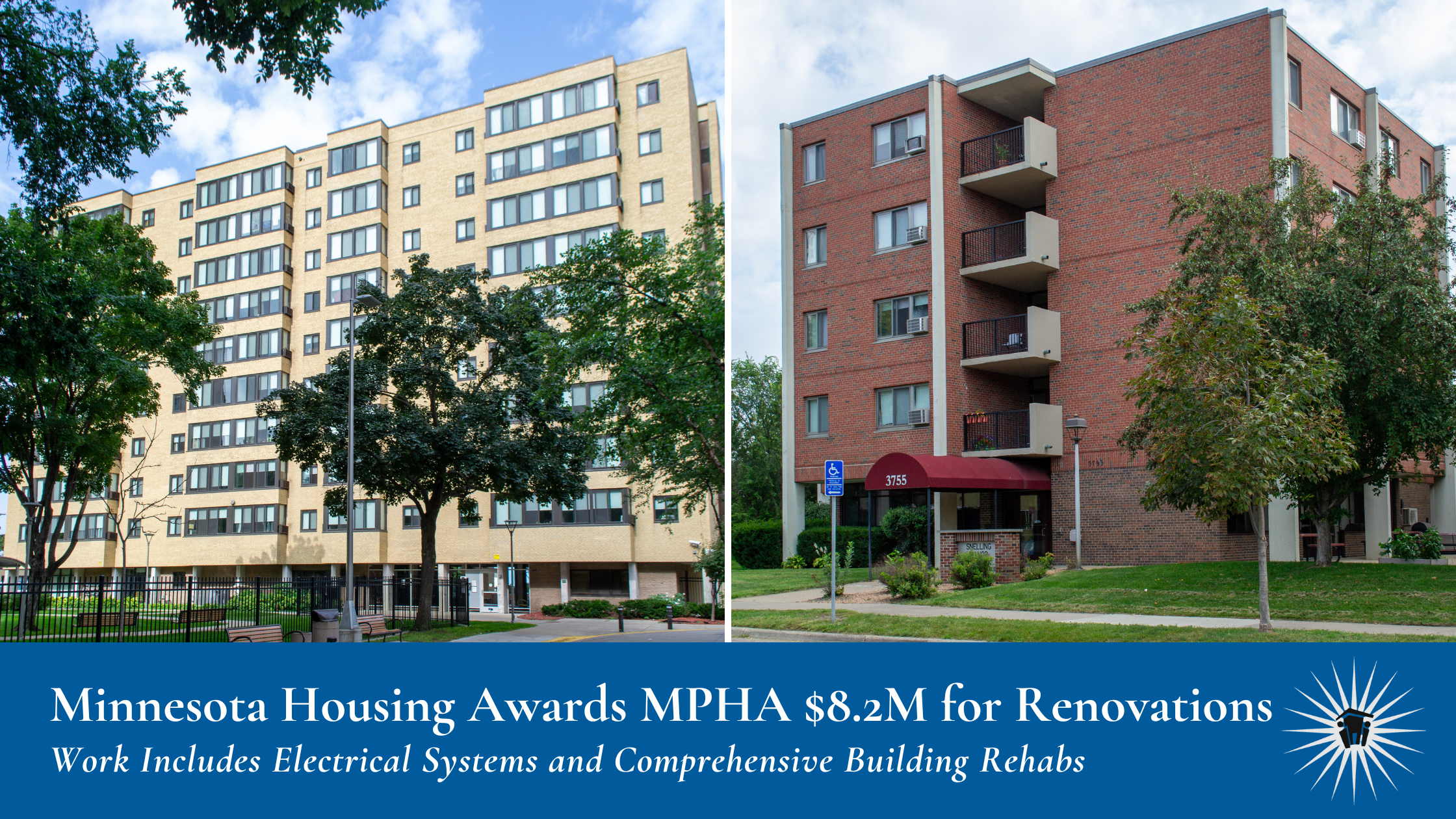Last week, the Minnesota Housing Board of Directors approved awarding MPHA $8,224,900 in Publicly Owned Housing Program (POHP) funding to replace aging electrical systems in three high-rises in the Cedar-Riverside neighborhood ($2.91 million) and to support comprehensive building rehabilitations at two mid-rises in the Howe neighborhood ($5.31 million).
“This investment from Minnesota Housing is going to improve the lives of hundreds of MPHA residents for decades to come,” said Abdi Warsame, Executive Director/CEO of the Minneapolis Public Housing Authority. “Beyond the critical work of replacing and upgrading electrical systems at three high-rises, this award enables MPHA to advance our next major renovation project at the Snellings, knowing we have these committed resources. At a time where our region faces a housing crisis, Minnesota Housing is meeting the moment. We thank Commissioner Ho and the Minnesota Housing team for this award, and we look forward to sharing more details about the Snellings redevelopment project in the coming months.”
For the three high-rises getting electrical system improvements (620 Cedar Ave., 1611 S 6th St., and 1627 S 6th St.), work will include replacing the buildings’ main electrical switch gear, distribution panels, and apartment panels which are beyond their expected useful life and do not comply with today’s city code requirements, along with replacing and upgrading the buildings’ emergency generators. More than 350 residents call these three buildings home, with 80 percent of residents being 62 or older. More than half of these residents report having a disability, and the median household income is just under $12,000 a year.
For the two other high-rises awarded funding (3755 Snelling Ave. and 3205 East 37th St.), MPHA intends on coupling this new funding with U.S. Department of Housing and Urban Development (HUD) conversion tools–which also increases ongoing federal funding for the properties–to complete comprehensive rehabilitations of both buildings (similar HUD tools MPHA has used at the Elliot Twins and Spring Manor).
While the full scope of the project still needs to be confirmed, it will likely include replacing and/or enhancing aging building systems (plumbing, electrical, HVAC), renovating in-unit kitchens and bathrooms, installing in-unit cooling and fresh air ventilation systems, adding accessibility upgrades to existing units where possible, and repairing exterior enveloping (windows, roofing, cladding/siding).
And, because of the size of the POHP funding award from Minnesota Housing, combined with MPHA capital funding, the city’s housing tax levy, additional federal funding, and potentially debt, MPHA intends to advance the project without tax credit equity or bond investments.
To date, MPHA has only used these HUD financial tools to fund complete building rehabilitations as a part of tax credit and bond projects. With the magnitude of state and local funding support MPHA has received, agency staff can consider using these tools without needing to pursue highly competitive Low-Income Housing Tax Credits (LIHTC) or bond awards. Practically speaking, this means redevelopment can move more swiftly without the added complexities that accompany tax credit and bond-financed projects. And by taking MPHA out of the applicant pool for LIHTC and bond awards for this project, it likely means additional non-MPHA affordable housing projects across the region will be awarded this critical funding.
However, more planning needs to be complete before renovations begin. Specifically, working with residents to co-create a clear vision for any future work. Agency staff began resident conversations earlier this summer that are expected to continue into next year. At the same time, agency staff will secure the necessary approvals from HUD while also finalizing the project’s financing plan. The agency intends to have additional details available to share for this project in the first half of 2026.
This award continues a spate of state funding MPHA has secured in recent years, including a first-of-its-kind direct cash grant of $5 million as a part of the legislature’s 2023 billion-dollar housing budget, a one-time $1.3 million grant from Minnesota Housing’s Stable Housing Organization Relief Program (SHORP), and a $1.35 million POHP General Obligation bond award last summer to replace aging electrical components at the 630 Cedar Avenue high-rise.



